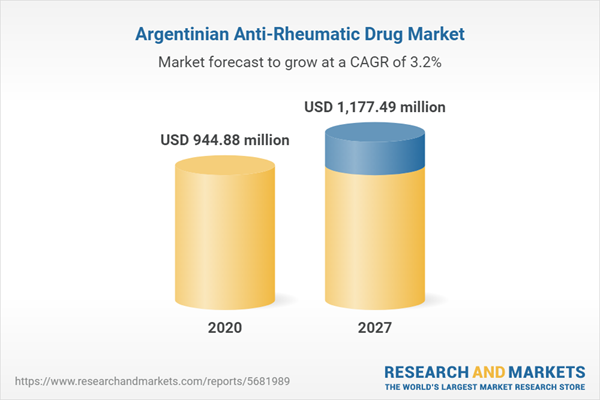Warm, swollen, & painful joints are symptoms of the medical illness rheumatoid arthritis. The illness primarily affects a person's hands and wrists. Pain is a symptom of this medical disease, and it gets worse over time. Different medications, referred to as anti-rheumatics, are used to treat this illness. Additionally, these medications are utilized to alter the course of the illness. For instance, anti-rheumatic medications that reduce the progression of the disease include disease-modifying anti-rheumatics drugs. Additionally, medications such as non-steroidal anti-inflammatory medicines are used to treat rheumatoid arthritis.
The rise in the number of patients suffering from chronic diseases, including cardiovascular diseases, is witnessing continuous growth in Argentina. According to the World Health Organization, the total prevalence of diabetes in Argentina is 10.2% of the country's total population. The prevalence of these types of chronic diseases in Argentina is leading to a rise in the number of patients suffering from arthritis. This, in turn, drives the demand for antirheumatic drugs in the country. The high dominance of the domestic pharmaceutical industry is also contributing significantly to the antirheumatic drugs market as the locally produced drugs are way cheaper than the imported ones. According to the INDEC (National Institute of Statistics and Census), 70 percent of the domestic market turnover was made up of local manufacturers, whereas the remaining 30 percent accounted for resold imports. The rising prevalence of malaria cases in Argentina due to climatic conditions is another factor fueling the market growth of antirheumatic drugs in the country.
The Argentine antirheumatic drugs market has been segmented based on the type of disease, type of molecule, and sales channel. By type of disease, the market has been segmented as osteoarthritis, rheumatoid arthritis, gout, lupus, and others. By type of molecule, Argentina's Anti-rheumatic Drug market has been classified into pharmaceuticals and biopharmaceuticals. The market segmentation has also been done by sales channel as prescription and over-the-counter (OTC).
The rheumatoid arthritis sector is predicted to hold a significant market share depending on the type of disease. The industry for rheumatoid arthritis treatment is fueled by the rising prevalence of arthritis and associated joint issues. In addition, the development of rheumatoid arthritis is attributed to a change toward an unhealthy lifestyle, an increase in metabolic diseases and age, a family history of joint disorders, and an increase in obesity. Furthermore, improvements in biosimilar and innovative biologics are anticipated to open up new business prospects in the sector.
Due to the rise in the number of specialist hospitals needed to treat the medical condition, the prescription-based drug segment held the biggest share of the market by sales channel. Additionally, due to increased awareness of the rheumatoid arthritis treatment choices, the over-the-counter medicine sector is anticipated to grow at the quickest rate during the projection period. Another important element driving the expansion of the anti-rheumatics business is the simple accessibility of over-the-counter NSAIDs.
Recent Developments and expansions
In November 2019, the Food and Drugs Administration granted approval for Pfizer's biosimilar, abriladaTM, to treat several inflammatory conditions, notably rheumatoid arthritis.In order to develop, produce, and commercialize Xcimzane, a preclinical monoclonal antibody that is indicated to be a biosimilar of CIMZIA for the treatment of rheumatoid arthritis, Xbrane Biopharma AB and Biogen Inc. inked commercialization and license agreement in February 2022.
COVID-19 Impact
The market for anti-rheumatoid medications in Argentina has not been significantly impacted because drug production is regarded as one of the important services. Tocilizumab and hydroxychloroquine, medications for rheumatoid arthritis, have also been investigated for use in the treatment of the emerging coronavirus. However, the disruption in supply chain activities and a temporary halt in manufacturing activities slowed down the market growth.Segmentation
By Type of Disease
- Osteoarthritis
- Rheumatoid Arthritis
- Gout
- Lupus
By Type of Molecule
- Pharmaceuticals
- Biopharmaceuticals
By Sales Channel
- Prescription
- Over-The-Counter (OTC)
Table of Contents
Companies Mentioned
- Pfizer Inc.
- Eli Lilly and Company
- Amgen Inc.
Table Information
| Report Attribute | Details |
|---|---|
| No. of Pages | 73 |
| Published | October 2022 |
| Forecast Period | 2020 - 2027 |
| Estimated Market Value ( USD | $ 944.88 million |
| Forecasted Market Value ( USD | $ 1177.49 million |
| Compound Annual Growth Rate | 3.1% |
| Regions Covered | Argentina |
| No. of Companies Mentioned | 3 |









